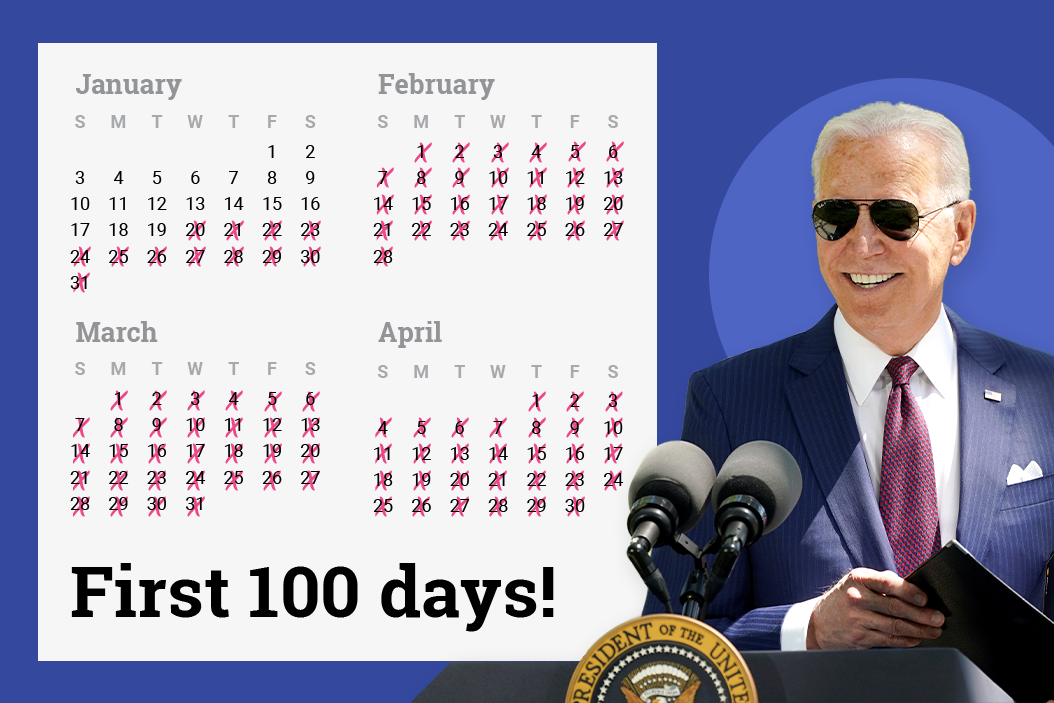April 29, 2021
There are many differences between America's two main political parties, but the most fundamental is this: Democrats say government can and should act boldly to improve people's lives and strengthen the nation. Republicans insist that government itself poses the greatest threat to individual liberty and the nation's lasting competitive strength. The past 100 days make crystal-clear which side of that argument President Joe Biden lives on.
Ronald Reagan's presidency in the 1980s seemed to finally settle this question in favor of less government. Bill Clinton, the first post-Reagan Democrat in the White House, famously told Congress in 1996 that "the era of big government is over." A generation later, outside of his ambitious healthcare reform plan, fellow Democrat Barack Obama was notably cautious on this question.
But the pandemic has given Biden an opportunity to show government can go big. Historically big.
Biden has focused almost entirely on two priorities: COVID vaccinations and economic recovery. Thanks in part to groundwork laid by the Trump administration, the president's focus on the pandemic has helped the United States become a vaccine success story. Biden first got a $1.9 trillion COVID-19 relief plan through Congress. Later he proposed a $2.3 trillion infrastructure and jobs bill and the so-called American Families Plan, a $1.8 trillion investment which includes both tax breaks and deep investment in education.
Biden's pandemic stimulus plan was about two and a half times larger than the plan his former boss Obama proposed in response to the global financial crisis despite much larger Democratic majorities in both houses in 2009. In fact, no US president has proposed anything on this scale since the days of World War II and the Marshall Plan. Biden has also announced his intention to end the war in Afghanistan, the longest in US history, by the 20th anniversary of the 9/11 terrorist attacks later this year.
Politically, this strategy is working. Polling from Fox News, CNN, NBC, Washington Post-ABC, and Monmouth all give Biden solid favorability scores and place support for his plans in the mid-60s. A recent CBS/YouGov poll found that 77 percent support the withdrawal from Afghanistan. Investors seem to like these plans too. The US stock market closed Biden's first 100 days in office with the strongest start to a presidential term since Franklin Roosevelt in 1933. All of this encourages Democrats to hope that their core voters, weary of their caution, will reward their boldness.
But Biden knows it would be foolish to declare that the era of "big government is over" is now over, and his ambitious push is less a sign of strength than of urgency. Unlike under similarly ambitious presidents of the past, like Roosevelt in the 1930s and Lyndon Johnson in the 1960s, Democrats have razor-thin majorities in both houses of Congress. Clinton (1994) and Obama (2010) saw their party suffer blowout losses in their first midterm elections. If they lose control of either house in November 2022, Biden's window of opportunity will close until at least 2025.
The new president knows he hasn't won over GOP lawmakers or voters — just 11 percent of Republicans think he's doing a good job — and that the electoral college and control of state legislatures give Republicans important and lasting electoral advantages.
There are also distractions and dangers ahead. Much of what Biden has proposed so far can be achieved without Republican support, but that's not true for gun restrictions or immigration, a subject that Republican voters consider a priority and which Biden hasn't done much about. Racism poses challenges well beyond the powers of any policymaker, and even passage of a new voting rights act will be a heavy lift. And the withdrawal from Afghanistan will not go smoothly if Taliban forces become more aggressive before US troops have left.
Finally, economic expectations are now sky-high, consumer sentiment is on the rise, and any failure to sustain what has been billed as a coming boom will weigh on Biden's popularity.
Presidential terms are judged on what is accomplished over 1,461 days, not 100. Much of what Biden has proposed remains in the blueprint stage, and the end of the pandemic will leave many Americans less reliant on government action.
Bottom line: The debate over government's proper role in American life has raged since the early days of the republic, and that fight will continue. Biden has months, not years, to make his case for a more activist federal government. Eras in American politics don't last as long as they used to, and Republicans are waiting anxiously in the wings.
From Your Site Articles
- Joe Biden wins: here's what it means - GZERO Media ›
- Joe Biden's plan to remake America - GZERO Media ›
- Joe Biden's 100-day dash - GZERO Media ›
- Democrats need to be united to pass $3.5 trillion budget plan - GZERO Media ›
- Democrats need to be united to pass $3.5 trillion budget plan - GZERO Media ›
- Progress on infrastructure bill despite Senate vote against it - GZERO Media ›
- What saved the global economy from another Great Depression? - GZERO Media ›
More For You
Most Popular
Think you know what's going on around the world? Here's your chance to prove it.
Xi Jinping has spent three years gutting his own military leadership. Five of the seven members of the Central Military Commission – China's supreme military authority – have been purged since 2023, all of whom were handpicked by Xi himself back in 2022.
From a resilient but divided consumer economy to cooling small business hiring, tighter housing affordability, and AI’s shift from buzzword to economic engine, 2025 revealed a “K-shaped” recovery and rapid technological transformation. Bank of America Institute’s 2025 Year in Review distills the data behind the year’s defining trends. Explore the 2025 Year in Review from Bank of America Institute.
© 2025 GZERO Media. All Rights Reserved | A Eurasia Group media company.
